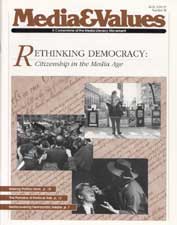Starting Point: In the Light of the Fires
|
This article originally appeared in Issue# 58
|
Throughout this issue we address the media's mandate to provide meaningful political discourse, an abstract phrase that we struggle to define.
But there's nothing abstract about the object lesson we all received here in Los Angeles this Spring on what can happen when political discourse fails. If I have any doubt about its concreteness, all I have to do is walk down the street and look at the boarded up appliance store in the mini-mall and the charred front of the little Mom and Pop store on the corner.
The fires are out now and the cameras are busy. TV screens that reflected infernos soon framed presidential candidates tromping through the rubble for the obligatory photo opportunity.
Media critics ponder the role of reporting in inflaming the rioters: Did TV pictures serve as a guide to likely targets? Did they play a role in making the disturbance acceptable? Did they create stereotypical heroes and villains? In a final irony for a riot ignited by the decision in the Rodney King case, looters who smiled for the TV camera one week are not laughing anymore. Videotapes that failed to convict four policemen of excessive force may be enough to condemn them of looting.
The TV cameras revealed a fatal flaw in the interconnections of our society. But in a different way, the frustration they reflected exists in the suburbs as well as the ghettos and barrios. Many people throughout the nation and the world are asking: Is anyone listening out there?
The problems of political discourse don't begin and end with the campaign trail, and the media are not the only institutions responsible for the general malaise we are feeling. But as the glue that binds our society together, the media do bear a heavy responsibility for feeding us a diet of scandals, controversies and personalities while failing to explore issues of concern to real people they reach.
When we answer the perennial question "Are you better off now than you were four years ago?" there are other questions to ponder, such as: "Am I being informed about the ways political candidates propose to deal with the problems of society? Do I know how and why issues, programs and policies are shaping the things I care about? Do I believe that my vision for a good society is being articulated and shared by politicians, media commentators and government officials?"
According to a Kettering Foundation study, many Americans, like citizens in other countries, yearn to take an active role in politics. But people lack three things: knowledge of how the political system works, a belief that they can make a difference and a process for engaging policy makers in an honest dialogue to discuss their concerns and seek solutions.
It is easy to make the media the whipping post for these deficiencies. But we believe these concerns have validity. Until the media reflect the concerns of people, not the corporate establishment that directs them, they will be able to frame only establishment answers. Worse still, they will be unable even to ask the right questions.
The means exist to do better. As several of our authors suggest, a mix of new technologies with the right goals and training could help people connect both with each other and with the powers that shape our lives. Even our current media structures can be better used by people who understand how they work and how to seek and evaluate the information needed for intelligent decisionmaking.
The suggestions provided in this issue can map the first steps on this road--steps that must be taken. I think we all would rather illuminate the darkness with the light of communication than put out fires.



